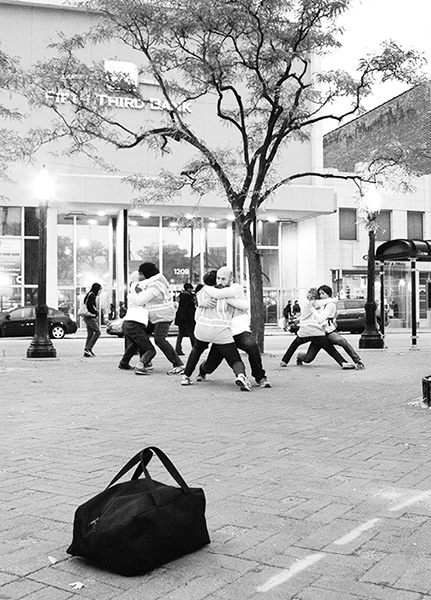
EMERGENCY RESPONSE TEAM
first performed on October 3, 2014
Polish Triangle, Chicago, IL
performed once in 2014
SARA ZALEK / GINGER KREBS
Chicago, IL
926830844s926830844a926830844r926830844a926830844@926830844s926830844a926830844r926830844a926830844t926830844o926830844n926830844i926830844n926830844.926830844c926830844o926830844m
saratonin.com
EMERGENCY RESPONSE TEAM
SARA ZALEK / GINGER KREBS
Inspired by the the Federal Emergency Management Agency’s Resolve to Be Ready campaign, “Emergency Response Team” treated the Polish Triangle as an assembly point and training area for disaster preparation. The six ERT team members conducted a series of drill maneuvers designed to build stamina, hone communication skills and demonstrate readiness for the physical and emotional rigors of catastrophe. The coordinated team action exemplified possibilities for cooperation in public spaces, while highlighting the ways in which public anxiety is increasingly “managed” as a public relations exercise. The speed of the movement alternated between crisply official and very slowed down to appear surreal, suggesting the kind of time warp sometimes experienced during moments of trauma.
From the brochure distributed to audience and passerby on October 3, 2014 5pm:
Thank you for volunteering to be a witness to our preparedness exercise. You will be role-playing the part of an onlooker at a disaster scene. All reasonable and customary safety measures will be performed during the exercise. If at any point you are asked to stop acting, please do so. For example, if the drill is called off because of a real emergency, please stop acting. If at any point the drill begins to jeopardize “really” injured people, you will be instructed to “freeze.” This means you should immediately stop acting to allow professionals to appropriately care for “real” victims.
During a disaster, you may see and hear things that will be unpleasant. Vicarious trauma, also known as compassion fatigue, is a natural reaction to exposure to a survivor’s trauma. A person who identifies too strongly with a survivor may take on that survivor’s feelings. Don’t dwell on the worst possibilities. Doing things that you enjoy, sticking to your normal routine, and being with friends and family will help make you feel better and keep you from worrying about the event.
Emergency Response Team is committed to strengthening the security and resilience of the United States through systematic preparation for the threats that pose the greatest risk to the security of the nation. We continue to become more secure and better prepared to prevent, protect against, mitigate, respond to, and recover from the full range of threats and hazards the nation faces, including aircraft emergencies, assaults, bomb threats, fire emergencies, hazardous material spills, hostage situations, medical emergencies, missing and kidnapped children, natural disasters, school disturbances, shootings, terrorism, utility failure and workplace violence.